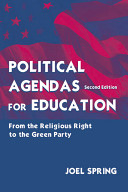
Political Agendas for Education
By - Spring, Joel H
Floor
-
Floor 1
Published
-
Lawrence Erlbaum Associates, Mahwah, N.J., ©2002
ISBN 10 - 0805839844
ISBN 13 - 9780805839845
Book Status
-
2 Qnty Available with us.
Subject
-
United States
Shelf No
-
20
Call Number
-
379.73 SPR 2002
Edition
-
2nd ed
Physical Description
-
viii, 143 pages : illustrations ; 24 cm.
Notes
-
Includes index.